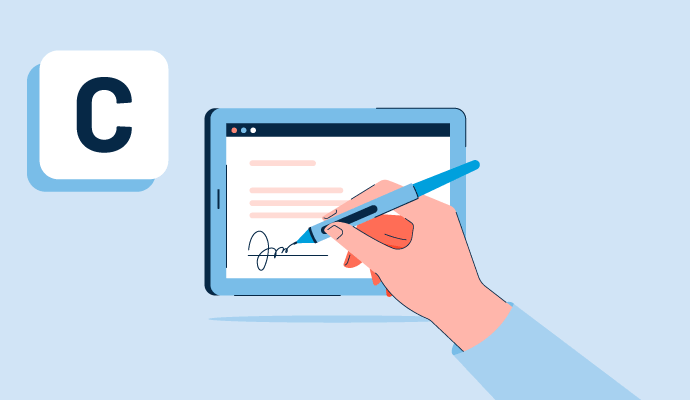What are contract templates?
Contract templates are standard agreements that can be easily completed to create a legally binding contract. Businesses use standard contract templates when the same agreement is repeated with minimal changes, such as for the same service or product. They use standardized or “boilerplate” language, found across most standard legal documents.
Legal teams leverage contract management software to create and access contract templates and save time. It’s common for departments on both sides of a deal to participate in the contracting process to ensure compliance with laws and regulations, as well as with internal company rules.
Types of contract templates
Businesses can create contract templates to reflect their specific needs. Some common types of contract templates to consider include the following.
- Partnership agreements are general business contracts used to specify the relationship between partners. Partnerships consist of two or more people. These legal documents outline the structure of the partnership and the rights, duties, ownership, interest, and assignment of profits and losses between partners. While partnerships may vary, a contract template can ensure a standard structure between businesses or individuals and their respective business partners.
- Indemnity agreements protect against loss. These contracts are most commonly seen in high-risk situations when a business needs to protect itself from liability. A standard indemnity agreement template is beneficial for guaranteeing the same level of protection across all clients and partners.
- Equipment leases can be necessary when businesses lease company-owned equipment to employees and contractors. These agreements are between the equipment owner and the borrower for a specified period.
- Non-disclosure agreements are used to protect confidential information from being shared. An example in business is an acquisition or merger. These agreements bind the person who signs it from sharing information included in the contract.
- Employment agreements are the relationship between a new employee and their employer. Standard contracts include details like employment type, pay rate, responsibilities, obligations, and expected hours of work. They may also include clauses for probationary periods and employer-paid benefits. Management and company executives may receive a template different from the standard employment agreement.
- Independent contractor agreements outline the terms and conditions of a relationship between the contractor and client. Contract templates may include a standard description of services, length of service, payment details, confidentiality clauses, and a termination clause.
Basic elements of contract templates
Five elements must be present for contracts to be legally binding and enforceable. Consider these elements when building out contract templates:
- Offer: One party makes an offer to another party. This specifies what the contract is for. The party receiving an offer can accept, revoke, alter, or terminate it.
- Acceptance refers to the unconditional acceptance of the offer outlined. Depending on the contract structure, an acceptance can be verbal or written. Signing a contract is a common way to convey acceptance of the terms outlined in the offer.
- Consideration necessitates a “mutuality of obligation,” meaning both parties must meet their obligations as outlined. Consideration can include services, actions, or prohibition of certain actions, goods, or property.
- Capacity means only signatories with legal capacity can enter contracts. These signatories must understand the terms and responsibilities outlined before signing. Signing parties must enter contracts without forced coercion.
- Legality ensures that contracts follow the laws of the jurisdiction they are in. If all elements are in place and the jurisdiction's requirements are met, the contract becomes legally binding.
Benefits of contract templates
Contracts are necessary for protecting the parties that enter them. Utilizing contract templates can help make the process easier. Below are some of the key benefits enterprises can expect from using contract templates:
- Less time spent drafting contracts. The most significant benefit of creating contract templates is the amount of time saved drafting contracts from scratch every time a new one is needed. Since teams need less time to draft contracts, they can more quickly provide a contract to a prospective client or party.
- Consistent clauses and language across agreements. Using contract templates helps increase the likelihood that clauses and contract language are consistent (or identical) across parties. This can help protect a business and ensure fairness for signatories with similar circumstances.
- Potential for fewer redlines. Predefined contracts can make the contract negotiation process smoother. When a business includes standard clauses and terms in all contracts, there are fewer term negotiations since the terms aren’t being drafted from scratch. Businesses may tell parties specific terms are non-negotiable and must be kept consistent across all clients.
Challenges with contract templates
Contract templates aren’t always perfect. Some challenges with contract templates to keep in mind include:
- One-size-fits-all. Not all deals are the same. The one-size-fits-all approach of a standard contract template can make it more challenging to customize contracts. While templates are a solid foundation, it’s essential to personalize the agreement for each specific situation.
- May not always be up-to-date. Contract templates can streamline the process, but only if the templates are regularly updated. For example, if a team member uses a previous template version, the contract issuer may have to go back and redo the contract to include new terms that were left out. Set aside time regularly to update contract templates.

Alyssa Towns
Alyssa Towns works in communications and change management and is a freelance writer for G2. She mainly writes SaaS, productivity, and career-adjacent content. In her spare time, Alyssa is either enjoying a new restaurant with her husband, playing with her Bengal cats Yeti and Yowie, adventuring outdoors, or reading a book from her TBR list.

